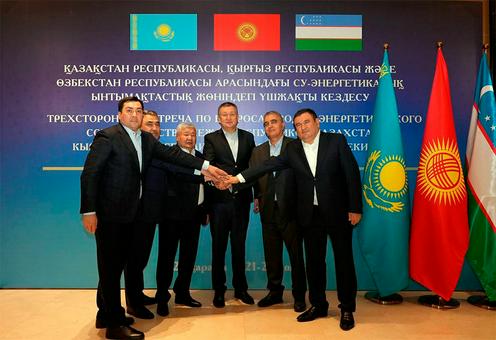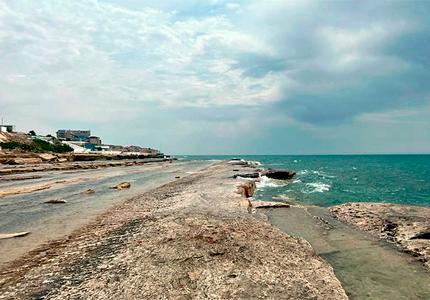Kazakhstan, Uzbekistan, and Kyrgyzstan have agreed to support one another through reciprocal supplies of electricity and water, according to a statement from Kazakhstan’s Ministry of Energy.
A meeting of the heads of the three countries’ water and energy agencies took place on November 22 in Almaty. Participants included Kazakhstan’s Minister of Water Resources and Irrigation, Nurzhan Nurzhigitov; Kyrgyzstan’s Minister of Energy, Taalaibek Ibraev; Uzbekistan’s Minister of Energy, Jurabek Mirzamakhmudov; Uzbekistan’s Minister of Water Management, Shavkat Khamraev; and Kyrgyzstan’s Deputy Minister of Water Resources, Agriculture, and Processing Industries, Almaz Zheenaliev.
The main topic of discussion was the difficult hydrological situation at the Toktogul Reservoir, where water levels have dropped compared with last year. Recently, Kyrgyz President Sadyr Japarov announced a decline of 2 billion cubic meters, prompting restrictions on electricity consumption nationwide. According to Deputy Prime Minister Edil Baisalov, regions across the country are subject to power-consumption limits of 3–4 kW, which helps prevent full rolling blackouts and maintain grid stability.
“Given the challenging situation at the Toktogul Reservoir, participants agreed to support one another through reciprocal electricity supplies and to coordinate efforts to ensure a stable heating season and prepare for the upcoming irrigation period,” Uzbekistan’s Ministry of Energy said.
Under the agreement:
▪️ Kazakhstan and Uzbekistan will supply electricity to Kyrgyzstan during the autumn–winter period, allowing Kyrgyzstan to reduce domestic winter generation and conserve water at the Toktogul Reservoir.
▪️ In spring and summer 2026, the accumulated water will be directed to Kazakhstan and Uzbekistan to ensure stable irrigation of agricultural lands in the southern regions of both countries.
The parties also emphasized the need for coordinated regional efforts to reduce energy consumption and promote energy efficiency. Uzbekistan confirmed its readiness to provide the technical capacity needed for electricity transit and grid balancing.
In addition, the three countries signed a trilateral protocol that legally formalizes the volumes of winter electricity supplies and the agreement on water accumulation through the 2026 irrigation season.
Meanwhile, Baisalov said Bishkek has asked Moscow to allocate an additional quota of natural gas, which would be processed at thermal power plants in Uzbekistan into electricity for Kyrgyzstan’s needs.
“It’s very expensive. But everything is being done to ensure comfort, so that we get through this winter warm and with the lights on,” Baisalov emphasized.










